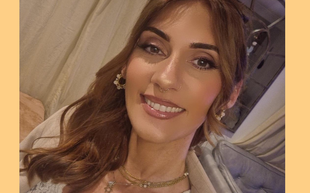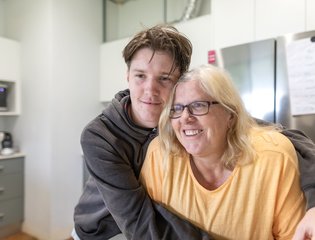Rebecca: I knew I had to love myself if I was to meet 'the one'.

Rebecca
At Ovarian Cancer Action, we know the impact of ovarian cancer extends far beyond physical health. For many, the journey includes changes to relationships, intimacy, and self-image. Rebecca’s story sheds light on these challenges and celebrates resilience, self-acceptance, and rediscovering joy after preventative surgery.
Here, in her own words, is Rebecca’s honest account of navigating sex and relationships after her hysterectomy:
“Since you last saw me, quite a lot has happened.”
"I had a beautiful baby girl, now five years old. I’ve had a full hysterectomy, gone through a divorce, and learned to love life as a single mother of two girls while navigating the challenges of early menopause.
At 32 years old, I made the decision to have a full hysterectomy to complete my preventative surgeries due to having a BRCA1 fault. I knew this would reduce my risk of ovarian cancer by 95%, but I didn’t fully realise the emotional and physical challenges ahead.
Finding myself after surgery
"My journey began eight years ago with a mastectomy, which changed my body and mindset. At the time, I thought my partner was supportive, but as the relationship broke down, I realised my physical changes were something they couldn’t accept. That was devastating.
For a while, I sought validation from others, prioritising male attention over my mental health. When my hysterectomy coincided with the end of a toxic relationship, I hit a low point. I was told no one would want me because I couldn’t have children and was 'no longer a woman.'
Those words stayed with me, but so did my determination to prioritise my health and my children’s future. I went ahead with the surgery. The physical recovery was challenging, but the emotional impact was immense. With no real aftercare, I had to dig my way out of rock bottom for the sake of my kids."
Dating after risk-reducing surgery
"Dating was exhausting. I felt like I had to disclose everything upfront: 'I can’t have kids, I have no nipples, and I’m in surgical menopause.'
It took time to find someone who accepted me for me, and I learned the hard way that true acceptance starts with yourself. I needed to love and accept my body – my 'foobs' (fake boobs), scars, and all – before I could find a partner who truly valued me.
I had to love myself if I was to meet 'the one'.

Rebecca
Rediscovering intimacy
"Sex after surgery was one of my biggest fears. I’d read horror stories and worried I’d never enjoy it again. The truth? It took time, patience, and the right partner, but sex became more enjoyable than ever once I’d properly healed.
There were challenges, of course. Menopause symptoms like low libido and vaginal dryness can make intimacy difficult, but solutions like lubricants and HRT can help. For me, regular infections from a small polyp were a hurdle, but with the right care and advocacy for myself, I overcame them.
Today, I feel comfortable in my skin. I’ve learned that I deserve intimacy and joy just as much as anyone else. The key was finding someone I felt completely relaxed with and taking the time to embrace this new chapter of my life."
Embracing life and loving me
"After everything I’ve been through, I’ve reached a place of self-acceptance. I love my body for what it is and what it represents: survival. I’m the happiest I’ve ever been and have finally met a man who loves me for me – because I love me for me.
I made these decisions to save my life, and every scar is a reminder of that. I’ll get to watch my daughters grow up, and that’s the greatest gift of all.
Sharing my story isn’t easy, but if it helps even one person feel less alone, it’s worth it. We all deserve to feel confident, loved, and happy – no matter what we’ve been through."
Supporting yourself after BRCA surgery
Rebecca’s story highlights the emotional and physical challenges of life after BRCA surgery. Whether it’s managing menopause symptoms, rediscovering intimacy, or embracing self-love, it’s important to seek support and advocate for your needs.
Learn more about risk-reducing surgery, surgical menopause, and finding the support you deserve on Ovarian Cancer Action’s website. Together, we can empower every individual to take control of their health and happiness.


